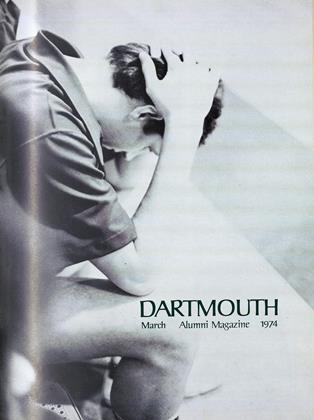By Robert C. Harvey '38. Grand Rapids, Mich.:William B. Eerdmans Publishing Company,1973. 216 pp. $3.95.
The Rev. Robert C. Harvey's Restless Heart represents a thoughtful and imaginative attempt to put the phenomenon popularly labeled "identity crisis" in its proper social perspective. In his study, Father Harvey discusses historical and current factors at work in shaping human identity, and, in so doing, establishes himself as an often astute observer of the social scene.
At the core of Father Harvey's treatment of his subject is his formulation of two distinct types of personality - "corporate" and "individual." In this scheme, the possessor of corporate personality "sees himself only as a member of an organism." He defines himself in terms of his membership in a single group. The possessor of "individual personality." by trast, is connected with numerous groups and associations but is, in some sense, psychologically independent of all of them.
Father Harvey also discusses at length two patterns of personality direction, "other direction" and "random direction." Of the former he writes, "multiple associations exist for the other-directed individual, but the one having priority is the one-making-demands-right-now." Random direction, though seemingly opposed to "other direction" is, in his words, "the reaction against the pull of the group by the basically other-directed. It recognizes only informal groups. The claims of family, church, nation, and culture are all disavowed."
Father Harvey's study has much to recommend it. He astutely identifies the problems presented by a culture which lacks the common assumptions and values once supplied by the Judaeo-Christian tradition to Western civilization as a whole. This loss of common valuereaps its most frightening harvest in the state of "random direction" which "denies the force of tradition, custom, and all that bears witness to a given authority and morality." This reviewer found Father Harvey's analysis of random direction most helpful in understanding a number of recent phenomena, from the excesses of the university rebellions of the late 1960s on the one hand to everything that is now lumped under the convenient heading of "Watergate" on the other. One wonders if either set of events would have occurred in the absence of the moral vacuum created by "random direction."
Naturally, no study as ambitious as TheRestless Heart could be without its flaws. This reviewer was somewhat dissatisfied with some of the author's broad generalizations about entire cultures, historical eras, and national populations. To assert, for example, that "Canadians and New Zealanders have remained individualists, while Americans and Australians have become collectivist," even given the strictness with which these terms are defined, seems to be painting in rather broad strokes.
The Restless Heart is an ambitious attempt to analyze a complex social and psychological phenomenon. As such, it well repays study.
Father Hitchcock is, like the author, anEpiscopal priest. A graduate of the GeneralTheological Seminary, he is currently on thestaff of the Church of the Resurrection is New York City.
 View Full Issue
View Full Issue
More From This Issue
-
 Feature
FeatureJournal of a Long Season
March 1974 By TOM EGGLESTON -
 Feature
FeatureTEMPLE B: Diary of Discovery
March 1974 By HUGH JOHNSTON AND SUZANNE JOHNSTON -
 Feature
FeatureConduit for the Faith)
March 1974 -
 Feature
FeatureDelivery Man
March 1974 By M.B.R. -
 Feature
Feature"The assurance of ancient kings"
March 1974 By Churchill P. Lathrop -
 Article
ArticleBig Green Teams
March 1974 By JACK DEGANGE
Books
-
 Books
BooksThe latest musical composition
MARCH 1932 -
 Books
BooksAlumni Publications
January 1936 -
 Books
BooksCRAZY WHITE MAN.
February 1953 By ROBERT MCKENNAN '25 -
 Books
BooksALUMNI PUBLICATIONS WHAT MAKES SAMMY RUN
April 1941 By Sidney Cox -
 Books
BooksTO THE GOLDEN SHORE. THE LIFE OF ADONIRAM JUDSON.
January 1957 By STEARNS MORSE -
 Books
BooksTHE SPADE AND THE BIBLE. W. W.
June 1934 By W. H. Wood

